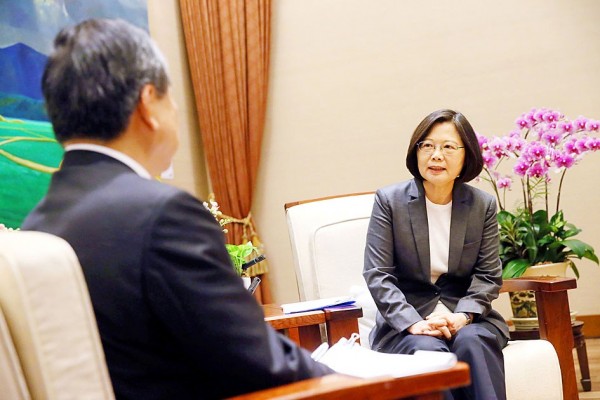《TAIPEI TIMES 焦點》 Tsai calls for calm cross-strait relations

President Tsai Ing-wen, right, speaks to a reporter from Japan’s Yomiuri Shimbun newspaper in Taipei on Thursday. Photo courtesy of the Presidential Office
MISUNDERSTANDINGS? The president urged Beijing to return to its stance shortly after her inauguration, when cross-strait issues were handled in a calm, rational way
/ Staff writer, with CNA
President Tsai Ing-wen (蔡英文) has expressed the hope that China will display more wisdom in resolving its differences with Taiwan and called for cross-strait relations to be dealt with calmly and rationally.
Tsai made the comments on Thursday in an interview with the Japanese Yomiuri Shimbun. The Presidential Office publicized the newspaper’s interview yesterday.
Tsai said that after she demonstrated Taiwan’s flexibility on cross-strait relations in her inaugural address on May 20, China had initially adopted a more measured approach.
However, Beijing has recently reverted to its old political tactic of exerting pressure on Taiwan.
“We do not think this offers a win-win scenario for both sides,” Tsai said.
Tsai reiterated her promise made on May 20 that Taiwan “will maintain the ‘status quo’ and our goodwill.”
“[We] hope the two sides will jointly resolve the problems facing us, but Taiwan and Taiwanese will not yield in the face of pressure,” Tsai said.
Taiwan has no desire to go back to a time when relations between the two sides were antagonistic, Tsai said, explaining that what Taiwan wants is “peaceful relations and cooperation so we can work together to resolve problems.”
She said that there might have been certain misunderstandings or misinterpretations in cross-strait relations recently.
“This has made us see the need to sit down as soon as possible so we can communicate and address problems,” she said.
Tsai urged Beijing to return to its stance shortly after her inauguration, when the two sides were able to handle cross-strait issues calmly and rationally.
“We will be patient, but also hope that the other side shows more wisdom,” she said.
Tsai also said that she used her May 20 speech to emphasize that the Republic of China (ROC) government would maintain the “status quo” of peace and stability in cross-strait relations based on historical facts and the existing political foundation.
Tsai said that her government would respect the historical fact that in 1992, institutions representing Taiwan and China engaged in negotiations that resulted in various joint acknowledgements and understandings.
“We believe that returning to the historical facts demonstrates our goodwill in the face of mainland China’s appeals,” Tsai said, calling for Beijing to put to one side “the baggage of history” and resolve cross-strait differences through constructive communication and interaction without preconditions.
The president also said in the interview that the dialogue between Taipei and Tokyo on maritime cooperation, which had been scheduled for this July, but has been since postponed allegedly due to the Okinotori atoll dispute in which Japan claims it to be an island and Taiwan demurs, is to be held soon and that she would like the Okinotori issue to be included on the agenda.
Acknowledging that there are differences in the two countries’ stances on the issue, Tsai said: “As the president of ROC Taiwan, I care most about our fishing rights, or the rights of our fishermen to undertake fishing activities and freely navigate in the relevant waters.”
When asked about Taiwan’s “naturally independence-leaning” young generation and how she would maintain a stable cross-strait relationship with the trend, Tsai said that the younger generation was born and grew up in Taiwan, so it is “unalterable that their identification with Taiwan and love for Taiwan is part of their life experience and natural humanity.”
“These young people grew up in a free and democratic environment and have independent thinking and judgement, so what they accept are values that they could identify with rather than being indoctrinated like Taiwanese used to,” she said.
Additional reporting by Su Fang-ho
新聞來源:TAIPEI TIMES















